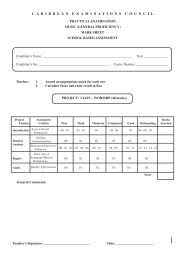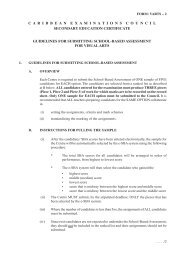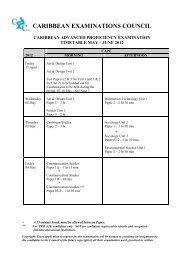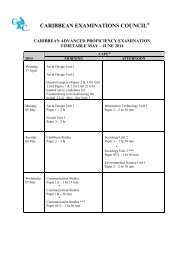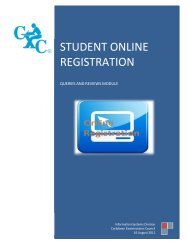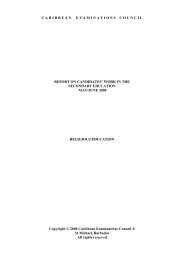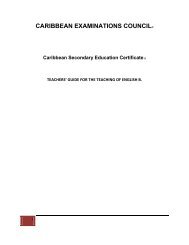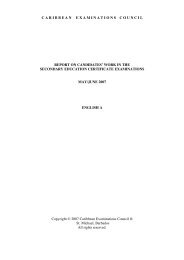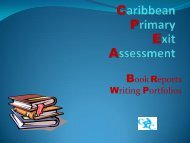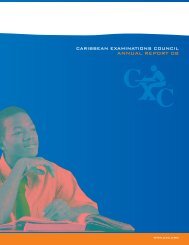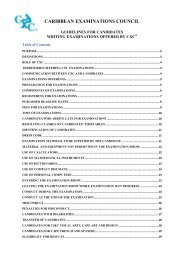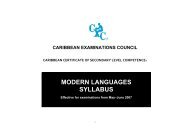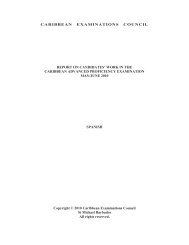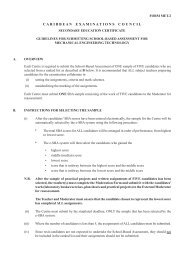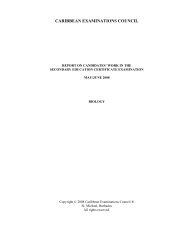CXC Examiner May 2012 - Caribbean Examinations Council
CXC Examiner May 2012 - Caribbean Examinations Council
CXC Examiner May 2012 - Caribbean Examinations Council
Create successful ePaper yourself
Turn your PDF publications into a flip-book with our unique Google optimized e-Paper software.
The <strong>Caribbean</strong> <strong>Examiner</strong>CPEA: Pilot Progressingthe Grenada Ministry of Education at the designatedcentres. These sessions facilitated interactionwith all the Grade VI teachers and provided theopportunity for teachers to showcase some of thework that was completed for the school basedassessment. Generally, most teachers had eithercompleted the required tasks or were workingtowards completion. In a few instances, teacherswho had not started a particular component hadthe opportunity to discuss with the team whatchallenges were being encountered and how thesecould be overcome. A common observation fromthe consultation with teachers was the feeling ofbeing overwhelmed by the numerous tasks required.However, in many cases, it was noted that theteacher had indeed completed what was required,but was demanding extra effort from the pupilsto ensure the production of work of the highestpossible quality.The incorporation of can-do-skills as aregular component of the instructional processand the development of both the pupil and teachertests were areas requiring the most clarification.Although frequent opportunities occurred in theclassroom where pupils demonstrated competencein areas taught, teachers were not aware that suchactivities, as simple as they were, comprised thecan-do-skills. One area of concern by the visitingteams was the absence of record keeping anddocumentation of pupils’ performance. Althoughthe discussions revealed that teachers had givenpupils the opportunity to improve through regularfeedback, this was not reflected in the records keptby the teachers. Secondly, many teachers had to bereminded that all teacher developed tests should bebased on a table of specifications that would serveas a blue print for developing the tests.In spite of the challenges faced, it was evidentthat excellent work is being done in the classroomas revealed by the work produced by the students.Whether it was the detailed book reports, someof which were enhanced by the construction ofcollages, costumes or models of scenes depicted inthe stories; the projects which came alive throughthe charts, pictures and detailed reports or thewriting portfolios that documented the improvedwriting skills of the pupils, the consensus was thatall pupils involved in the CPEA are excited abouttheir learning experiences. Perhaps the greatestgain with respect to pupils was the opportunityto develop tests for their peers, a novel activity inmost schools. However, many of the teachers whoadmitted reluctance to allow their pupils to write testitems were surprised by the quality of the items andthe learning opportunities which emerged.Parental InvolvementOne of the principles on which the CPEAwas developed was the need for greater parentalinvolvement in the work of the school community.The CPEA team is pleased to report that at allconsultations which were planned for the parents,there was standing room only. In the initialMaureen Grazette, Measurement and EvaluationOfficer at <strong>CXC</strong>, making a point while in a meetingwith teachers at a school in AnguillaAcquiring scientific literacies is one ofthe learning outcomes of the CPEAmeetings, parents were continually remindedto become more involved in the work of theirchildren and by extension the school, through theprovision of resources, expertise and facilitatingstudy at home. Further consultations revealed thatparents had heeded this advice and were generallyeager to report that they in turn had seen increasedinterest in reading, the completion of research andheightened motivation by their children.ConclusionGenerally, the <strong>CXC</strong> team is satisfied thatthe requirements for the formative assessmentof the programme are being completed. Pupilshave grown through activities such as completingprojects, working with peers, presenting writtenand oral reports and engaging in reflection andself-assessment. While the work of the <strong>CXC</strong> teamcontinues by addressing the major areas of concernas well as on-going orientation in the pilot andother territories, the team is confident that thepupils currently preparing for examinations havebenefited from a diverse and unique programmewhich has prepared them for entry into the nextphase of education.Benita Byer is aMeasurement andEvaluation Officerin the <strong>Examinations</strong>Development andProduction Divisionand is a member ofthe CPEA projectteam.www.cxc.org MAY <strong>2012</strong> 17



